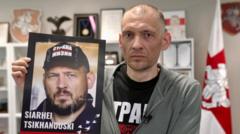Sergei Tikhanovsky, once a prominent opposition blogger in Belarus, has been released from five years of harsh imprisonment. He lost significant weight during his confinement but claims his spirit remains unbroken. Following international pressure, including engagement from a U.S. delegation, Tikhanovsky is now advocating for the release of over 1,000 political prisoners still held in Belarus, while his wife, Svetlana Tikhanovskaya, leads the opposition.
Belarusian Opposition Leader Sergei Tikhanovsky Emerges from Isolation with Renewed Resolve

Belarusian Opposition Leader Sergei Tikhanovsky Emerges from Isolation with Renewed Resolve
After years of imprisonment and solitary confinement, Belarusian opposition figure Sergei Tikhanovsky shares his experiences and determination for a democratic Belarus following his surprise release.
In a remarkable turn of events, Sergei Tikhanovsky, a Belarusian opposition leader, has been released after spending over five years imprisoned under brutal conditions. Tikhanovsky, who gained prominence as a political blogger critiquing the regime of Alexander Lukashenko, reflected on the immense challenges he faced during his time in solitary confinement, where he was deprived of speech and communication.
Upon meeting him shortly after his unexpected release in Vilnius, Tikhanovsky emphasized that the inability to express himself was the most torturous aspect of his imprisonment. "When you can't say or write anything… you're just trapped in a cell – that's the toughest thing," he stated, demonstrating the psychological toll of his experience. His release followed a rare visit to Belarus from a senior U.S. delegation that was presumably aimed at discussing multiple issues, including American prisoners held by the regime.
The impact of his imprisonment is stark—he has lost almost 132 pounds, drastically altering his appearance. Yet, Tikhanovsky expressed a resolute spirit, declaring that despite physical changes, his resolve to fight for change in Belarus remains unbroken, stating, "Maybe it's even stronger." He recounted the heartbreaking moment of reuniting with his daughter, who did not recognize him due to his emaciated state after years of isolation.
Tikhanovsky’s story is one of resistance against a regime accused of electoral fraud and repression. His bold attempt to run for president in 2020 was met with immediate arrest, and following his incarceration, significant protests erupted as his wife, Svetlana Tikhanovskaya, took his place as a candidate and garnered massive support.
In prison, Tikhanovsky underwent severe treatment, often isolated in punishment cells, and faced threats of prolonged incarceration. When he began to hear rumors of a possible release, he maintained his commitment to his principles, refusing to confess to any crimes despite the pressure.
His recent freedom reflects a broader backdrop of political negotiations, as Lukashenko seeks to re-engage with the West after years of isolation due to his crackdown on dissent. Tikhanovsky acknowledged the complex motivations behind his release, attributing it to an effort by Lukashenko to portray a more democratic facade amidst ongoing international scrutiny.
As he navigates the complexities of his newfound freedom, Tikhanovsky is not only focused on his family but also on advocating for the release of the over 1,000 remaining political prisoners. His wife, now a leading opposition voice, remains cautious about international relations, emphasizing that any sanctions should not be lifted until genuine reforms occur in Belarus.
In his first week out of prison, Tikhanovsky has been actively participating in discussions, reconnecting with loved ones, and expressing gratitude to international figures who helped facilitate his release. He remains determined to contribute to the fight for democracy in Belarus, signaling that while the road ahead may be fraught with challenges, his mission remains clear.
Upon meeting him shortly after his unexpected release in Vilnius, Tikhanovsky emphasized that the inability to express himself was the most torturous aspect of his imprisonment. "When you can't say or write anything… you're just trapped in a cell – that's the toughest thing," he stated, demonstrating the psychological toll of his experience. His release followed a rare visit to Belarus from a senior U.S. delegation that was presumably aimed at discussing multiple issues, including American prisoners held by the regime.
The impact of his imprisonment is stark—he has lost almost 132 pounds, drastically altering his appearance. Yet, Tikhanovsky expressed a resolute spirit, declaring that despite physical changes, his resolve to fight for change in Belarus remains unbroken, stating, "Maybe it's even stronger." He recounted the heartbreaking moment of reuniting with his daughter, who did not recognize him due to his emaciated state after years of isolation.
Tikhanovsky’s story is one of resistance against a regime accused of electoral fraud and repression. His bold attempt to run for president in 2020 was met with immediate arrest, and following his incarceration, significant protests erupted as his wife, Svetlana Tikhanovskaya, took his place as a candidate and garnered massive support.
In prison, Tikhanovsky underwent severe treatment, often isolated in punishment cells, and faced threats of prolonged incarceration. When he began to hear rumors of a possible release, he maintained his commitment to his principles, refusing to confess to any crimes despite the pressure.
His recent freedom reflects a broader backdrop of political negotiations, as Lukashenko seeks to re-engage with the West after years of isolation due to his crackdown on dissent. Tikhanovsky acknowledged the complex motivations behind his release, attributing it to an effort by Lukashenko to portray a more democratic facade amidst ongoing international scrutiny.
As he navigates the complexities of his newfound freedom, Tikhanovsky is not only focused on his family but also on advocating for the release of the over 1,000 remaining political prisoners. His wife, now a leading opposition voice, remains cautious about international relations, emphasizing that any sanctions should not be lifted until genuine reforms occur in Belarus.
In his first week out of prison, Tikhanovsky has been actively participating in discussions, reconnecting with loved ones, and expressing gratitude to international figures who helped facilitate his release. He remains determined to contribute to the fight for democracy in Belarus, signaling that while the road ahead may be fraught with challenges, his mission remains clear.















